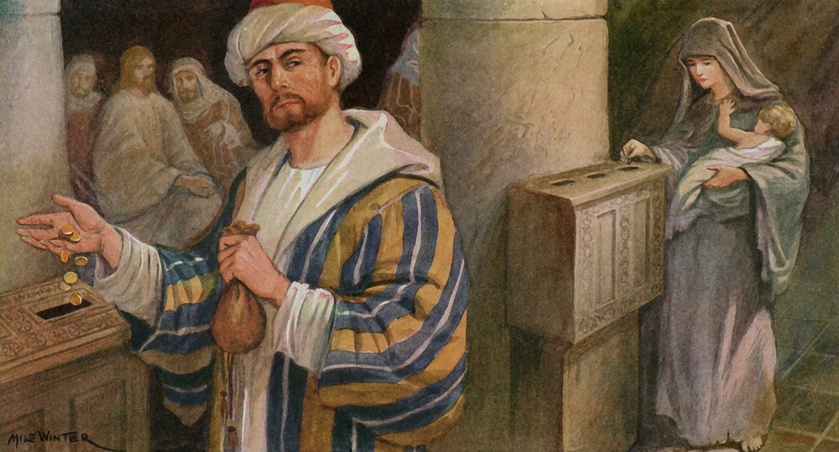James 2:1
"My brothers and sisters, show no partiality [favoritism] as you hold the faith in our Lord Jesus Christ, the Lord of glory."
It may be smart, this sign of showing favoritism, but it is sin, in the same way that murder and adultery are sin. It's the sin of discrimination. And it's contrary to God’s design. It's difficult to say you love your neighbor as yourself when you are motivated to be discriminatory towards others who are not to your liking. Living a life in faith is living selflessly always, not just when it's convenient. There are never moments when it's not sin to discriminate against others. To operate in this discriminatory manner is to make yourself a law unto yourself. A law contrary to God's law. And this attitude toward the law of God draws attention away from the needs of others and makes the merits of the self into law. This is how one arrives at self-righteousness and a philosophy of self justification.
With God there is no respecter of persons (Romans 2:11). We know Jesus was no respecter of persons because his disciples taught that he wasn't.
Acts 10:34
So, Peter opened his mouth and said: "Truly I understand that God shows no partiality, but in every nation anyone who fears him and does what is right is acceptable to him."
When we sit together in assembly, we are all on the same level. We are all of equal importance to The Lord. And therefore, it is not right that our faith should reject, restrain, restrict, or otherwise abuse others based upon their personal circumstances. When we sit before the Lord, we sit together on the same level in His estimation. The slave may preach to his master in the same assembly. The erudite rich man may learn the truths of gospel wisdom from the nescient simply man whose testimony is founded in sincere faith and the holy scriptures. It doesn't take a PhD to know God and speak the gospel truth. In fact, I could argue that it's likely the academic world has been teaching false Christs for a very long time now.
God established equality in the law. There's no special dispensations set aside for either the poor or the rich. Neither for the young or old, or the wise and the ignorant. The law measures all by the same principles. Our behavior towards one another should be likewise equitable. We should not become judges or juries making distinctions about worth or value.
James 2:4
"have you not then made distinctions among yourselves and become judges with evil thoughts?"
And we know what defiles a man.
Matthew 7:15 - Jesus said:
"There is nothing outside a person that by going into him can defile him, but the things that come out of a person are what defile him."
We are all joint heirs with Jesus Christ. All citizens of Heaven. And to adopt any other attitude, to despise some because of their situations, is to make yourself a wicked judge guilty of sin. You dishonor your fellow citizens of heaven and dishonor God.
James 2:8-9
"If you really fulfill the royal law according to the Scripture, "You shall love your neighbor as yourself," you are doing well. But if you show partiality, you are committing sin and are convicted by the law as transgressors."
In order for us to be truly doing the gospel and to be sincerely accountable to the gospel we must follow this royal law of God's. We must be doers of "love your neighbor as yourself". No matter who you are or what you do to try and balance the scales of justice, if you break this one command of the law, you're therefore a lawbreaker, an outlaw. And everything you do to make yourself right in the sight of God is then made unholy because of this one violation. The deeds you do will manifest themselves in your faith. These works will manifest true faith or true self-righteousness. And the result of those wicked works is you make yourself subject to the law of justice, you get what you give.
James 2:13
"For judgment is without mercy to one who has shown no mercy. Mercy triumphs over judgment."
These principles about partiality are likewise applied in situations having to do with matters of faith and its perceived value to some who have faith that is rich in traditions and founded upon the spirit of organized religion verses those who have faith in Christ alone (sola fide).
We're all judged by the same judge who judges with the same values. And the value is mercy. His name is Holy. Holiness and mercy, forgiveness and grace are his values.
Matthew 7:1-3
"Judge not, that you be not judged. For with the judgment you pronounce you will be judged, and with the measure you use it will be measured to you. Why do you see the speck that is in your brother's eye, but do not notice the log that is in your own eye?"
The brother of Jesus is driving at something here. He moves immediately from this conversation about partiality into a deep look into how it is that faith must be demonstrating its true nature. It's not that James is saying we are saved by our works of faith, he is saying that some use these partialities that they have to also abuse their brothers and sisters in need. He's saying if we truly love one another then we won't look for excuses to not give love when it's needed. And that faith that doesn't love even those who they despise, is not a living faith. It is dead in this sin of partiality. That faith is not producing love. It is not being love. And therefore, it does not know God.
1 John 4:7
"Beloved, let us love one another, for love is from God, and whoever loves has been born of God and knows God."
And so, this is the context in which we find the comment that so many Christian people abuse.
James 2:17
"So also, faith by itself, if it does not have works, is dead."
What is the context of that comment?
The context has to do with the demonstration of faith, or lack thereof, when some discriminate against their brothers and sisters. That faith that does not live, alive in the royal law, is dead in the sin of partiality. This is the spirit of the entire law. And this is why James says...
James 2:26
"For as the body apart from the spirit is dead, so also faith apart from works is dead."
He's not saying that salvation is contingent upon works. What he's saying is without faith no man can be moved into works of faith. Faith produces works, works demonstrates the faith. Therefore, justifying grace is genuine when you practice that grace in obedience to the royal law. The fruit of righteousness comes from the law of love, the royal law of love for one another. It is this fruit of the Spirit that bears witness to our faith being alive and well.
Galatians 5:22-23
"the fruit of the Spirit is love, joy, peace, patience, kindness, goodness, faithfulness, gentleness, self-control; against such things there is no law."
Demonstrate-able faith. This is the value of the royal law, if you think you have no need of it know this, following the whole of the law is not required to become a disciple of Christ, but fulfilling the royal law is expected of the disciples of Christ. If you live by the Spirit, you will not live by your sinful nature. If you are in the Spirit, you won't gratify yourself in these discriminatory acts and you won't depend upon legalisms and self-righteousness. To have the Spirit is to live by the Spirit.
"The fruit of the Spirit is the witness of the Spirit . . . and without these the testimony itself cannot continue" - John Wesley
When God's grace has grasped us and justified us, when we as sinners have accepted this responsibility, God’s sanctifying grace begins its work. If then His Spirit is alive in us and in our faith, we must then be demonstrating it in our obedience to the royal law. Any other expression can only mean that our faith is dead. It is totally inconsistent to live according to the wicked ways of people. A state that is not possible for one who is in the Spirit and the Spirit is in them.
Galatians 5:14
"For the entire law is fulfilled in keeping this one command: “Love your neighbor as yourself.”"
THEREFORE
Galatians 5:25-26
"Since we live by the Spirit, let us keep in step with the Spirit. Let us not become conceited, provoking and envying each other."




















